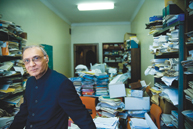From shadow to light
Summit proposes spirituality as antidote to 9/11 horror

Arvind Sharma in his Birks Building office
Claudio Calligaris
It sounds like the set-up to an old Vaudeville bit: "A Christian, a Buddhist and a Wiccan were standing in a conference hall when a pagan walked by…" But for five days this fall, that's the eclectic mix you'll find at the Global Congress on World's Religions After September 11, organized by and presided over by congress president and McGill's Birks professor of comparative religion, Arvind Sharma.
As per the congress title, the event is ecumenical in nature, gathering leaders from the world's major and minor religions to address many of the issues facing the planet since the cataclysmic events of 9/11.
The Montreal congress, which will run from September 11 to 15, was conceived as a response to growing apprehension about religion in an era when every headline seems to have a religious angle. Panel discussions and symposiums will cover a broad range of subjects regarding the role of religion in everything from war and science to healing and international diplomacy. Speakers will include the iconic Deepak Chopra and Nobel Peace Prize Laureate and Iranian human rights activist Shirin Ebadi.
Horror burned in memory
Like most people, Sharma remembers exactly where he was that morning. While eating in the cafeteria of the Presbyterian College at McGill, he noticed a clutch of people huddled around the TV.
There was a collective gasp when the second tower was hit and the truth became clear — this was no freak accident, it was a terrorist attack. "My first reaction was 'Mahatma Gandhi was right,'" remembers Sharma. "The modern world is so intermeshed and the weapons of destruction so powerful that the only proper manner in which one should vent their grievances is through non-violent means."
The attack struck a devastating blow to the symbolic economic heart of the Western world and brought front-page notoriety to al-Qaeda's fundamentalist views that the ills of the world could be traced back to secular influences. Overnight, especially for Americans who felt targeted and victimized, Islam became synonymous with evil, aggression and terror.
But Sharma believes that the impact of 9/11 hit deeper than that, tainting the public's perception of all religions, not just Islam. He also suggests that because the attack was so horrific, many have forgotten that it was just the most infamous expression of a fundamentalist movement that dates back to the Iranian Revolution of 1979.
"Prior to 1979, religious studies and the role of religion in life was operating under what we call the secular hypothesis," he says. "Namely, as mankind develops economically and becomes more democratic, religion either disappears altogether, in the most extreme version, or it will disappear from public life and become a purely personal thing, much like a person's interest in literature."
Sharma attributes the revolution in Iran to a backlash against secularism and the perceived loss of power of the country's religious tradition. "My own take is that it is as difficult to repress human religiosity as it is to repress human sexuality," says Sharma. "You can't do it for a long time because the human desire for an absolute or for a larger context in which to find the meaning of life is so strong that it cannot be repressed."
At the very core of the congress agenda, however, will be the continued refinement of the Universal Declaration of Human Rights by the World's Religions, a project launched in 1998 at a previous congress in Montreal.
The document was inspired by the 1948 Universal Declaration of Human Rights. Like the UN declaration, which was drafted in response to such secular extremism as fascism and totalitarianism, the World's Religions' document provides a theoretical antidote to religious extremism.
The World's Religions' declaration continues to welcome input from people of all walks of life, from scholars and academics to the most devout among us. "Not only does this demonstrate that religions can work together in a productive fashion, it also is evidence that the divide between the religious and the secular can be gulfed," says Sharma.

